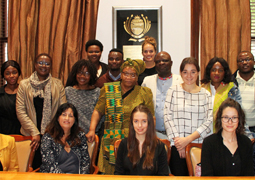
The Chairperson of the National Council of Provinces, Ms Thandi Modise, with University of Cape Town master’s students
In the last day of her tenure in office as the Chairperson of the National Council of Provinces (NCOP), Ms Thandi Modise hosted 18 University of Cape Town master’s students studying Comparative Social Policy in Africa. The course is about policy analysis, policy formulation and policy making processes and is designed to provide students with an understanding of the contemporary debates and issues in the field of social policy, with special reference to the Global South and the context within the African continent.
In her wide-ranging conversation with the students, she touched on her passions: the women’s cause, the role of the NCOP and how it could be improved in the Sixth Parliament, the need to relook at our electoral laws, as well as the changes brought to bear on the work of the South African Legislative Sector by Brics (Brazil, Russia, India, and South Africa) Parliament.
She started her deliberation by contextualising the role and mandate of the Fifth Parliament, which sought to be an activist Parliament. According to her, “part of our role as NCOP we had to ensure that the public purse is managed accordingly and there is value derived from money spent by the executive. We gauged this in relation to the impact that government policies have had on ordinary South Africans.”
In keeping with the notion of the “Activist” Parliament, she alleged that the NCOP refused in various instances to be overpowered by the executive in passing certain laws. “There are laws that we expressed our dissatisfaction with, that we declared our unhappiness with. And we would often say no to the executive with our eyes wide open.”
She added that there is a need for the NCOP to assert itself thoroughly and unapologetically. “If the NCOP were to conduct its intergovernmental mandate thoroughly, there is a need to hold the executive accountable more effectively and efficiently.”
As such, “our intergovernmental mandate gives us a right to mediate executive powers in line with our Constitution. If not, we have to intervene accordingly and ensure that it upholds the tenets of our Constitution”.
She, though, identified shortcomings inherent between the South African Legislative Sector and the executive. One of which is the current practice which allows the executive to have powers over budgetary allocations of the legislative sector. “We are challenging this practice and we feel that it is not constitutional because the legislative sector is not a department, but an arm of the state. Therefore, what it requires to do its work cannot be determined by an arm that it should oversee.”
If we continue with this practice, the legislative sector will always remain weak, because naturally “the executive won’t go out of its way to ensure that it gives us resources to oversee it more effectively and efficiently”.
As part of improving the effectiveness of the NCOP going forward, there is a need to ensure that Members of the NCOP are “trained enough to undertake their mandate. This would enable the House to exercise its constitutional powers more effectively”. Hence the NCOP decided to forge relations with universities to achieve this objective. And this would go a long way in sustaining our democracy, she said. “This was intended to ensure that we produce competent Members of Parliament. That is crucial in sustaining our democracy.”
She, though, maintained that our country should ensure that women hold strategic positions to advance social development. “Women’s role in advancing social development cannot be disputed. Until we have more and more women in decision-making positions, we are not going to change the world.”
Speaking of the Brics Parliament, she claimed that it in fact has restored the constitutional mandate of parliaments. “Before, the executive would ratify treaties alone with no obligation to present them before their parliaments for legislative scrutiny or to verify their constitutionality and relevance to respective countries’ policies. No, that has changed. Parliaments of Brics counties have the power to hold the executive accountable for the treaties they now enter into.”
In the same vein, she decried the fact that the African Union remains nothing more than a boys’ club that does not recognise the significance of African Parliaments’ oversight roles. “Even the Peer Review Mechanism they came up with failed to achieve it intended goals. Worse of all, even the Pan-African Parliament, she added, “is not what it was envisaged to be”.
The Chairperson of the NCOP is worried about the escalating incidents of racism. And is of the view that the Sixth Parliament would do something to address this. “Let’s not make the burden of our generation that of our future generation. As such, let’s not judge people based on the texture of their hair, but of what they are capable of. Colour of our skin has nothing to do with who we are.”
Weighing in on the ongoing debate on the need to have a relook at the advantages and disadvantages of our electoral system, she pointed out that “although our current electoral system has ensured that there is a geographic representation of all South Africans in our Parliament, it has its own shortcomings. One is that South Africans are compelled to vote for a party rather than their own chosen representative that would directly be accountable to them. Secondly, most often a Member of Parliament is compelled to follow a party line even if his or her conscience does not agree with it. These are some of the considerations that necessitate a need to have a relook at our electoral system.”
By Abel Mputing
28 March 2019

